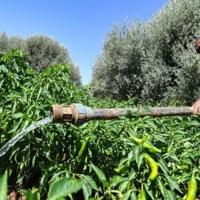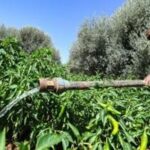Showing the contrast between parched crops and lush green plants, a small farming project in northwest Tunisia highlights the impact of foreign funding and local determination in combating climate change.
Farmer Saida Zouaoui’s local dam in the village of Ghardimaou, built after years of hard work, has made her a hero among smallholder farmers who credit it for increasing their production despite a six-year drought.
Zouaoui’s stone and cement dam, constructed with European Union funding and technical support from the International Labour Organization, showcases how such assistance is helping vulnerable nations adapt to climate change.
The upcoming COP29 climate summit in Azerbaijan will focus on global funding from wealthier, high-polluting nations to aid poorer countries in coping with a warming planet. However, there are still major disagreements over the amount to be paid and by whom.
“We need to adapt to climate change,” said Zouaoui, 44, as she worked to clear branches and debris from the dam’s stream.
“We are aware of the region’s water-related challenges, but we must find solutions and not lose hope.”
As a child, Zouaoui witnessed her father and grandfather trying to build a makeshift reservoir with sandbags in Ghardimaou, but the lack of proper infrastructure and funding led to their failure.
Water stress has worsened in Tunisia, which is already the 20th most water-stressed country according to the World Resources Institute, with national dams shrinking to less than a quarter of their capacity.
In Zouaoui’s village, traditional dykes that used to irrigate up to 48 hectares have now decreased to only 12 hectares due to water scarcity.
Many farmers, especially younger ones, have left the village, and those who stayed had to reduce cultivated areas and avoid water-intensive crops.
– EU funding –
Zouaoui had proposed the idea of a dam to Tunisian authorities before the 2011 revolution, but it was rejected as unprofitable. However, with EU funding covering 90% of the costs, the dam was finally built in 2019.
Local farmers contributed the remaining 10% of the cost and provided labor and logistics. The EU, Tunisia’s top aid and commercial partner, allocated significant funds to support projects related to agriculture and water management.
– ‘Changed my life’ –
ILO’s Khemissi praised Zouaoui’s project as a model of local development and emphasized the organization’s goal of supporting projects that combat climate change and create jobs in marginalized areas.
Despite being an impoverished region, Tunisia’s northwest is known for its fertile land and agricultural production. Zouaoui’s dam has provided water to 45 small farms, allowing farmers to expand their crops and improve their livelihoods.
Zouaoui’s efforts have breathed new life into the village, giving hope to farmers who had almost given up due to neglect from authorities. Through her determination and the support of EU funding, Zouaoui has truly made a difference in the lives of her community.





